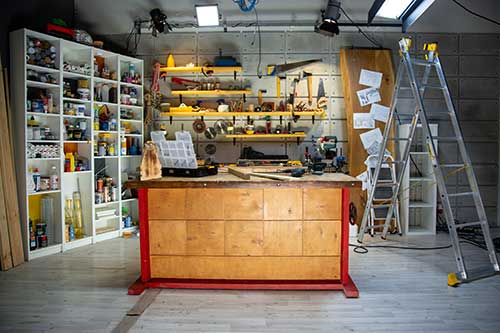Finding the perfect space to work on your woodworking projects can be tricky, but it’s definitely achievable! The ideal spot will depend on your needs, budget, and the type of projects you tackle. Here are some options to consider:
1. Home Sweet Workshop:
If you have the space and resources, creating a dedicated workshop at home is the ultimate dream. This gives you complete control over your environment and allows you to personalize it to your specific needs. However, it requires significant investment in tools, equipment, and ventilation systems.
- Pros: Convenience, privacy, and customization. You can tailor your workspace to your specific needs and preferences.
- Cons: Requires dedicated space, can be noisy and dusty, and might not be suitable for larger projects.
2. Community Workshop Magic:
Many communities offer shared workshops or makerspaces equipped with woodworking tools and machinery. This is a fantastic option for beginners or those with limited space at home. Membership fees are usually reasonable, and you gain access to a wider range of tools than you might be able to afford individually. Plus, you get the benefit of interacting with other woodworkers and learning from their experiences.
- Pros: Access to a wider range of tools and equipment, often including heavy machinery. Shared space fosters a sense of community and allows you to learn from others.
- Cons: Membership fees, limited access during peak hours, and potential waiting times for specific tools.
3. Garage Guru:
Transforming your garage into a woodworking haven is a popular and cost-effective solution. Ensure proper ventilation and dust control, and you’ll have a decent space to work on smaller to medium-sized projects.Remember to consider noise levels if you have close neighbors.
4. Rent-A Hobby Shop:
Several storage facilities offer rentable workshop spaces, also called hobby shops. This is a flexible option for occasional projects or those requiring specialized equipment you might not own. Just be sure to factor in rental costs and transportation logistics.
- Pros: Affordable option, flexible space usage, and potential climate control for sensitive projects.
- Cons: Not ideal for noisy tasks, limited access compared to a dedicated workshop, and might require additional permits depending on local regulations.
Tips for renting a storage unit for woodworking:
- Choose a unit with ample lighting and ventilation.
- Consider noise restrictions and potential complaints from neighbors.
- Ensure the unit is large enough to accommodate your tools and projects comfortably.
5. The Great Outdoors:
For smaller, weather-permitting projects, working outdoors can be a refreshing and space-saving option. However,ensure you have proper protection from the elements and noise control if necessary. Keep in mind that outdoor woodworking comes with limitations on power tools and project size.
Bonus Tip:
Check with local schools or colleges offering woodworking programs. They sometimes rent out their workshops to the public during off-hours, providing access to high-quality equipment at reasonable rates.
Remember, the most important factor is finding a space that inspires you and allows you to comfortably and safely pursue your woodworking passion. So, explore your options, weigh the pros and cons, and get ready to create something amazing!



